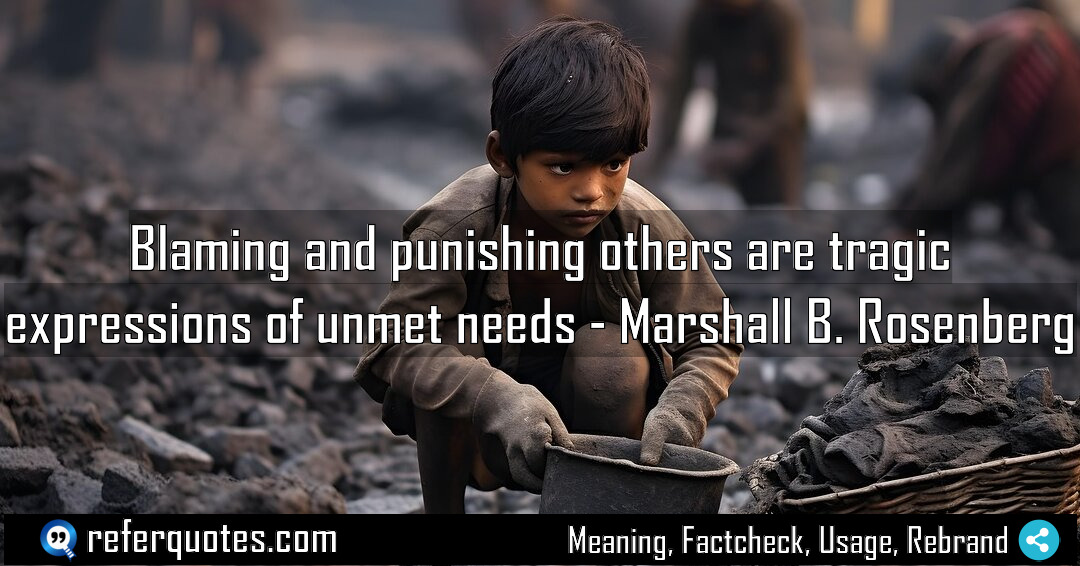
Blaming and punishing others are tragic expressions… it sounds harsh, right? But this quote from Marshall Rosenberg flips the script on conflict. It argues that our anger and blame aren’t about the other person—they’re a desperate signal of something we deeply need ourselves. Once you see this, it changes everything about how you handle disagreements.
Share Image Quote:
Table of Contents
Meaning
At its core, this means that blame and punishment are never the real story. They’re just the surface-level symptom of a deeper, unmet need within us.
Explanation
Let me break this down. For years, I used to think conflict was about who was right and who was wrong. This quote rewired that. When someone blames you—or when you feel that urge to blame someone else—it’s not the primary emotion. It’s a secondary, tragic reaction. The real engine underneath is a need—for respect, for consideration, for support, for peace—that isn’t being met. The tragedy is that by blaming, we actually make it less likely we’ll get that need met. We push people away instead of connecting. It’s a failed strategy. A really, really common one.
Quote Summary
Reading Level75
Aesthetic Score70
Origin & Factcheck
This is straight from Marshall B. Rosenberg’s seminal work, Nonviolent Communication: A Language of Life. The book first came out in the late 1990s, born from Rosenberg’s work in the United States. You sometimes see similar sentiments floating around, but this specific, powerful phrasing is uniquely his.
Attribution Summary
Where is this quotation located?
| Quotation | Blaming and punishing others are tragic expressions of unmet needs |
| Book Details | Publication Year: 1999; ISBN: 9781892005038; Last edition: 3rd Edition (2015); Number of pages: 264. |
| Where is it? | Chapter 6: Requesting That Which Would Enrich Life, Page 102 (2015 edition) |
Context
In the book, this isn’t just a nice idea. It’s the fundamental pivot point of the entire Nonviolent Communication (NVC) model. Rosenberg presents it as the key that unlocks empathy. Before you can honestly express yourself or hear others, you have to see past the blame to the human need crying out underneath.
Usage Examples
So how do you use this? It’s a game-changer in so many situations.
First, in leadership. Instead of punishing an employee for a missed deadline, you get curious. “I notice this happened, and I’m feeling concerned because I have a need for reliability and shared success. What’s going on?” It transforms the conversation.
Second, in relationships. Your partner didn’t do the dishes. The blame is “You’re so lazy!” The unmet need? Probably for support and shared responsibility. Articulating that need is the path to a solution.
And third, for yourself. When you catch yourself seething about someone, pause and ask: “What am I truly needing right now that I’m not getting?” It’s the ultimate power move.
To whom it appeals?
Share This Quote Image & Motivate
Motivation Score70
Popularity Score85
Shareability Score75
FAQ
Question: Does this mean we should never hold people accountable?
Answer: Not at all! It’s the opposite. True accountability comes from addressing the root cause (the unmet need), not just punishing the symptom (the behavior). It’s about creating change, not just assigning pain.
Question: What if the other person is genuinely at fault?
Answer: “Fault” is a concept this model actively moves away from. It’s not about who’s wrong, but about what everybody needs. Focusing on needs is what actually resolves the situation and prevents it from happening again.
Question: Isn’t this really hard to do in the heat of the moment?
Answer: Absolutely. It’s a practice. It feels unnatural at first because we’re so conditioned to blame. But with time, that pause to find the need becomes a habit, and it saves you so much unnecessary conflict.
Similar Quotes
You know, when Marshall Rosenberg said “Punishment damages goodwill and self-esteem,” he was really onto something. It’s a game-changer for how we interact with people, especially when things go wrong.…
When we fail to set boundaries and hold people accountable, we end up feeling completely drained and resentful. It’s a direct line from our own inaction to that feeling of…
You know, when Marshall Rosenberg said “Use anger as a wake-up call,” he was giving us a powerful tool. It’s not about suppressing that fiery emotion, but about listening to…
You know, “The emotionally intelligent person takes responsibility” is one of those lines that seems simple but is absolutely transformative in practice. It’s the difference between feeling like a victim…
You know, that idea that “We are not victims of our situation” is a game-changer. It shifts the entire responsibility for our outcomes from external forces to our own choices…
